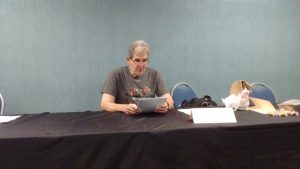Capclave 2017 was held last weekend in Gaithersburg and I went because I like Capclave. It is a rare opportunity for the Great Unwashed to mix with the better science fiction writers/editors/artists/booksellers/whatnot unencumbered by security lines and overpriced autograph fees common to the big cons. Capclave is for true fans of the written word and the wielders of such words. Without cosplay. At least, intentional cosplay.
- Scott Edelman did a reading of a story that’s about to appear in print and, master of suspense that he is, he ran out of time right at the reveal. Drat. Now I must buy it. Hey, wait a minute…
Scott Edelman is Mr. Syfy Channel, which is enough to elevate him to some pantheon, but he is also a former Marvelite, which lords him over such a pantheon. He met his wife at Marvel, which makes the two of them on par with those Egyptian husband/wife gods (yeah, yeah, there’s brother and sister issues in there somewhere but you know what I mean). I asked him if Sean Howe’s book, Marvel Comics the Untold Story is accurate. After all, Mr. Edelman appears in it. He assured me it was dead-on, which is somewhat heartbreaking for us former Merry Marvel Marching Society members who grew up worshipping Stan Lee and Jack “King” Kirby and the whole Marvel Bullpen. Read it to see what I mean.
2.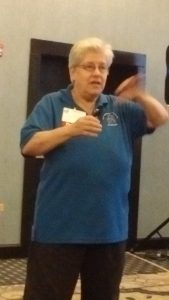 Inge Heyer is an astronomer (which also elevates her into pantheon status) and gave a delightful presentation on the recent solar eclipse. She had gone to Rimini, SC to observe totality, setting up in a campground. When the local crawdad fisherman sharing the campsite took note of the preparations, they inquired as to what was going on. “Total eclipse of the sun,” she sang and the crawdaddies said “Oh” and went back to work. Some people remain underwhelmed. She explained Bailey’s beads (named after some guy named Bailey. BFO),
Inge Heyer is an astronomer (which also elevates her into pantheon status) and gave a delightful presentation on the recent solar eclipse. She had gone to Rimini, SC to observe totality, setting up in a campground. When the local crawdad fisherman sharing the campsite took note of the preparations, they inquired as to what was going on. “Total eclipse of the sun,” she sang and the crawdaddies said “Oh” and went back to work. Some people remain underwhelmed. She explained Bailey’s beads (named after some guy named Bailey. BFO), 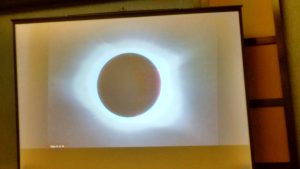 which are the bright spots caused by sunlight running down moon valleys, and the diamond ring effect, when sunlight runs down a particularly big moon valley and the eclipse looks like a big engagement ring set in the sky. God’s proposing to us, I guess. One thing I did not know: at totality, you can look directly at the sun unaided without adverse effects. No eclipse glasses needed. There’s not enough energy at totality to damage your eyes, But wait one second longer…
which are the bright spots caused by sunlight running down moon valleys, and the diamond ring effect, when sunlight runs down a particularly big moon valley and the eclipse looks like a big engagement ring set in the sky. God’s proposing to us, I guess. One thing I did not know: at totality, you can look directly at the sun unaided without adverse effects. No eclipse glasses needed. There’s not enough energy at totality to damage your eyes, But wait one second longer…
BTW, if you want to see if your eclipse glasses are frauds, wear them in a well-lit room. If you can see anything at all, then throw them away. Real eclipse glasses allow only a dim view of the sun.
The next total eclipse will be 8 April 2024, running from the southwest US through the northeast, opposite of this most recent track. Mark your calendars.
The most famous eclipse, at least, to the audience, was the 1919 one, which Einstein used to prove the theory of relativity. He had an opportunity to do so a few years earlier, but WW1 put the kibosh on eclipse observations. Which was a good thing because Einstein had gotten the math wrong and would have been disproved.
Who says war is not the answer?
3. 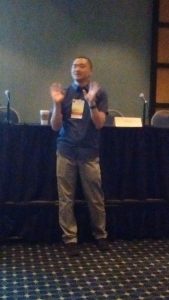 Ken Liu was one of two Capclave Guests of Honor, and he gave a lecture entitled Betrayal of Integrity ― Conformance and Estrangement in Translating Chinese Science Fiction. I saw that title slide and immediately the robot was running around waving its arms and yelling, “Danger, Will Robinson!” And yep, Liu’s basic theme is power relationships between so-called “superior” and “inferior” cultures and the influence that has on translations, and guess which “superior” culture is imperialistic and racist even when it translates from and to its own languages? C’mon, you got this. Here’s a hint: science fiction is not understandable except as a literature of imperialism.
Ken Liu was one of two Capclave Guests of Honor, and he gave a lecture entitled Betrayal of Integrity ― Conformance and Estrangement in Translating Chinese Science Fiction. I saw that title slide and immediately the robot was running around waving its arms and yelling, “Danger, Will Robinson!” And yep, Liu’s basic theme is power relationships between so-called “superior” and “inferior” cultures and the influence that has on translations, and guess which “superior” culture is imperialistic and racist even when it translates from and to its own languages? C’mon, you got this. Here’s a hint: science fiction is not understandable except as a literature of imperialism.
As George Orwell said, some ideas are so stupid that only intellectuals believe them.
Despite all the dialectic, Liu presented some fascinating issues in translation, such as formal and dynamic equivalence. Do you try to recreate the form of the language you’re translating, or do you try to elicit the same reaction in the target audience as in the original audience? Formal equivalence is respectful of the translated language, but it’s more difficult to convey the concepts. Dynamic is more successful in concept conveyance but only if there are shared references. For example, there’s an idiom in Chinese about a very handsome man, “as good looking as Pai Man,” or something like that. We barbarians have no idea that Pai Man was a prince so popular with the ladies that his carriage would be filled with flowers from all the women running up and throwing them at him. We would say, “Adonis,” but look how much you lose in that. As Liu posited, how do you convey a steel building into a culture that uses bamboo?
Guess you don’t. You muddle along the best you can, relying on the commonality of the human condition to convey your meaning. But that’s not very academic, is it?
Liu treated us to a fascinating history of how late 19th Century Chinese intellectuals, in their desire to modernize China, translated English works to expose the populace to Western ideas. Lu Xun popularized science fiction by translating a Japanese translation of an English translation of Frenchy Jules Verne’s From the Earth to the Moon. What could go wrong? He showed us. It was hilarious.
Liu had much to say about traditional imperialism, Western imperialism, of course, and it was pointed out to him that traditional Chinese culture has had its own imperialistic moments, just ask its neighbors. Liu responded there was no such thing as traditional Chinese culture because China was made up of different nations and Westerners called Chinese aggressive states ‘imperialistic’ but that was meaningless because Chinese aggression was towards other Chinese states so it’s not imperialism and “I’m Chinese and you can’t tell me about my culture.”
Really?
Well, I can tell you about mine, and we once had an identical concept. It was called anschluss.
4. 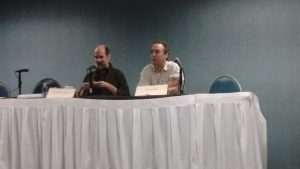 The other Guest of Honor was Neil Clarke, who is just the best guy. Just is. Approachable, self-deprecating, encouraging, the right kind of editor for one of the best scifi magazines out there. One day I hope to write a story good enough for inclusion. One day.
The other Guest of Honor was Neil Clarke, who is just the best guy. Just is. Approachable, self-deprecating, encouraging, the right kind of editor for one of the best scifi magazines out there. One day I hope to write a story good enough for inclusion. One day.
Mr. Clarke said his first exposure to science fiction was Lost in Space and he was hooked because, really, what boy didn’t want to be Will Robinson and have a robot pal? He got hooked on short stories when his cousin gave him a copy of Adventures in Time and Space and the first magazine he subscribed to was Omni.
Mr. Clarke didn’t know that fandom existed until college, when his friends dragged him off to a convention, probably Lunacon. He went to several conventions after that, but then noticed a wall between the fans and the writers. Once the panels were done, the writers disappeared so he stopped going. He became a collector, sometimes having 3-4 editions of the same work so he’d sell on EBay to feed his habit. The collection turned into a bookstore called Clarkesworld that became quite successful, and he resumed con attendance.
At Readercon in 2006, Mr. Clarke was on a Meet the Pros panel and came up with a business plan for an online magazine spun out of the bookstore. He had it staffed and running within a week, a combination of “overconfidence and a little knowledge being a dangerous thing.” Mr. Clarke came from a technical background and didn’t feel qualified to be the editor, but stepped up when Nick Mamatas left.
Online magazines were considered low-class back then, the province of pirates and newbies and were shunned by named writers (even though Cory Doctorow observed that, if you ain’t being pirated, then you haven’t arrived. Words to that effect.). The ezines were starting up and disappearing in a matter of months and the first three years of Clarkesworld were simply survival. Ellen Datlow changed everyone’s mind about online fiction, though, and Clarkesworld flourished, winning a Hugo for Best Semi-ProZine.
Mr. Clarke has a “pay-it-forward” view and feels he owes the scifi community. There are too many scifi and fantasy markets right now and not enough readers, so either markets can close or readership can grow and which do you think he prefers? “We have to go to where the readers are” he said, and wants to eliminate any excuses anyone is using to avoid reading the stories. He’s expanded short stories internationally and has a YouTube channel that gets 50 percent of its viewers from outside the US.
Foreign scifi writers regard the American market as the pinnacle, and think themselves unworthy. No one should think themselves unworthy to submit to Clarkesworld, something I personally find encouraging. I mean, my stories suck, but at least I’m allowed to play. Mr. Clarke emphasized that the story gets rejected, not the author. He’s rejected stories submitted by NYT Best Sellers.
See why I love this guy?
Mr. Clarke had a “widowmaker” heart attack at Readercon a few years ago. He thought he was just sick so didn’t go to the hospital for three hours and he’s lucky to be alive because he suffered a lot of damage. I sympathize and empathize because my blockage was at the widowmaker site, too, but I didn’t have a heart attack so was spared the damage. He had a defibrillator installed and thought it would be great for a “cyborg to edit an anthology about cyborgs;” hence, the book Upgraded, which I bought from the Clarkesworld table in the Dealer’s Room, along with More Human than Human and I subscribed to the magazine, too. I figured it’s about time I put my money where my mouth was.
Mr. Clarke has been very cooperative with his cardiologist, which heart docs are not used to because older patients don’t want to put up with all the hassle. I may be one of the exceptions because I still got things to do.
He was asked what three stories he would put on Voyager’s golden disc and said that list would change every day but definitely something by Philip K. Dick because that would really mess up whoever found it. Sure would.
5. I spent the rest of Saturday afternoon learning how to play Terraforming Mars,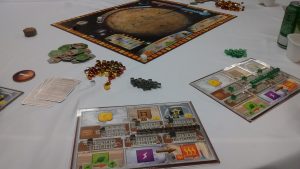 under the gentle guidance and encouragement of the nicest lady. She only hit me once. What a great game. I came in second, behind the nice lady who only hit me once.
under the gentle guidance and encouragement of the nicest lady. She only hit me once. What a great game. I came in second, behind the nice lady who only hit me once.
6. I spent Saturday evening at the best Chinese restaurant I’ve been to in years, the Yu Zhou Café. Chinese tour buses were pulling up and depositing Chinese tourists so that should give you an idea. This should give you another:
7. 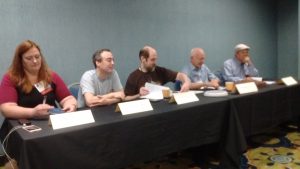 I went to panel on Sunday called Editing the Short Story, with Neil Clarke, his sidekick Kate Baker, Bud Sparhawk, Scott H. Andrews, and Scott Roberts, not pictured in that order. Basically, it was editors explaining why or why not they spend time with submissions. Mr. Clarke said he gets 1200 submissions a month so there’s no time for editing a story into something he wants. If he likes a story but it needs some work, he’ll send an Email to the author asking if there’s a willingness to fix it. Roberts echoed that he had no time for editing but he won’t ask for changes. If he likes a story but there’s issues he simply rejects it. Andrews does rewrites of accepted stories and personalizes all of his rejection letters, something that surprised the other panelists. Guess there’s a bit of variety out there among editors.
I went to panel on Sunday called Editing the Short Story, with Neil Clarke, his sidekick Kate Baker, Bud Sparhawk, Scott H. Andrews, and Scott Roberts, not pictured in that order. Basically, it was editors explaining why or why not they spend time with submissions. Mr. Clarke said he gets 1200 submissions a month so there’s no time for editing a story into something he wants. If he likes a story but it needs some work, he’ll send an Email to the author asking if there’s a willingness to fix it. Roberts echoed that he had no time for editing but he won’t ask for changes. If he likes a story but there’s issues he simply rejects it. Andrews does rewrites of accepted stories and personalizes all of his rejection letters, something that surprised the other panelists. Guess there’s a bit of variety out there among editors.
Sparhawk is not an editor and said every one of the other panelists had rejected a story from him at least once. He suffers from PSS: premature submission syndrome (I do, too). Sparhawk writes his story in three parts and, when it’s satisfactory, treats it like a piece of music, refining it until it’s ready. Nice.
A lot of authors don’t know where to start or end their story and lots of times the story gets edited to the middle of what was submitted. The rewrites, though, are usually quite good and Andrews ends up giving a contract to ¾ of them, something that also surprised the others. That Andrews is a surprising guy. Voice is important and becomes an issue if the rewrite is months later because often the voice is different. It’s like spackle on a wall.
Writers can be sensitive (ya think?). Andrews has developed a series of stock phrases when negotiating with a writer, like, “If this fits within the vision of your story.” All the editors spend a lot of time putting in stock phrases such as “to me” and “for me” to avoid tone issues. Roberts said that he used to make jokes in his rejection letters until Orson Scott Card told him to knock it off.
Clarke stated there’s a point in a rejected story where an author loses him, and it’s usually due to a problem in the setup. The pace of a story is not about the length but the sequence. Every story has a length it wants to be and sometimes it’s not cutting the story that fixes it but adding to it. Clarkesworld raised its word count from 4000 to 8000 and heard from many authors that the sweet spot was 5000. Clarke noted that quality went down after that because authors were no longer self-editing their stories to meet the 4000 word limit. Andrews would rather see too much in a story than not enough because then it can be cut.
Roberts reads his own stories aloud because he doesn’t have a “wise reader” or a writing group and everyone else pretty much agreed that reading a story aloud helps find the problems. Clarke will print a story out and read it because a change in medium helps, too. Clarke said that reading a submission to the end will drive an editor crazy so you have to know when to stop reading it, usually at the point where he loses interest. Becoming a slush reader for a magazine is an excellent way to learn what’s wrong with your own writing because you’ll see the same mistakes.
The worst kind of rejection is self-rejection, the feeling some writers have that they are not good enough. Don’t do that. Submit your stories. Otherwise, how will you ever know?
See why I go to Capclave?
